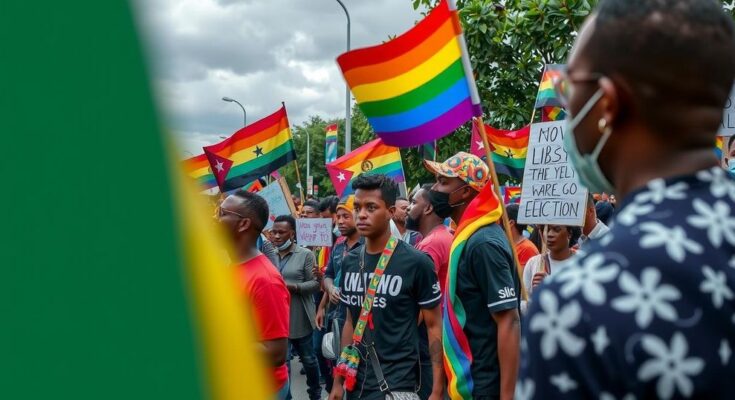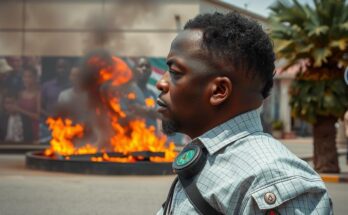In Ghana’s imminent general elections, major presidential candidates are promoting anti-LGBTQ+ legislation, reflecting and amplifying public hostility towards the LGBTQ+ community. A crucial bill threatening criminal penalties for identifying as LGBTQ+ awaits a Supreme Court ruling, complicating an already hostile environment for voters with LGBTQ+ identities. Community members face a troubling reality where their safety and rights hang in the balance amid the political climate, while international objections raise concerns about human rights violations in Ghana.
Ghana’s upcoming general elections present a daunting dilemma for the LGBTQ+ community, as the leading presidential candidates have vowed to tighten restrictions on gay rights to appeal to the prevalent anti-LGBTQ+ sentiments among voters. The newly elected leader will likely face the immediate decision of signing or vetoing a proposed bill, passed by parliament earlier this year, which prescribes imprisonment for individuals identifying as LGBTQ+. This bill is set to be reviewed by the Supreme Court for constitutionality shortly after the elections, intensifying the stakes for voters with LGBTQ+ identities.
The candidate representing the ruling party, Mahamudu Bawumia, has made clear his intention to endorse the bill, while his chief rival, former president John Dramani Mahama, has criticized LGBTQ+ activities without definitively stating his position on the bill’s enactment. Statements from community members, such as Abena, express a profound sense of exclusion and fear, noting the implications of their votes potentially endorsing increased persecution.
While Ghana already has laws criminalizing same-sex relations, the proposed legislation expands the definition of illegal acts and raises penalties, exacerbating discrimination against sexual and gender minorities. The bill proposes sentences of up to five years for same-sex activities and penalizes advocacy efforts, which could deter support for LGBTQ+ programs. Furthermore, it mandates family members and associates to report individuals suspected of being LGBTQ+, further entrenching fear and secrecy within the community.
Public sentiment against LGBTQ+ rights has been fueled by the introduction of this bill, with religious organizations actively campaigning for its passage, promoting views that label same-sex relationships as unethical. The societal impact is substantial; increased violence and discrimination against LGBTQ+ individuals have already been observed as the public adopts a more hostile attitude.
Human rights activists express alarm that if this bill becomes law, its provisions will only serve to push LGBTQ+ individuals further into hiding, jeopardizing their employment, housing, and educational opportunities. There are concerns that professionals who advocate for LGBTQ+ rights may face limitations in their careers as institutions may adopt stricter policies in response to the new legal environment.
The international community has reacted negatively to the trajectory of proposed legislation in Ghana. The European Union has characterized it as “profoundly disturbing,” citing violations of Ghana’s constitutional and human rights obligations. The potential loss of international donor support has also been highlighted, indicating significant repercussions should the legislation proceed.
As the Supreme Court deliberates an array of legal challenges regarding procedural missteps during the bill’s introduction, the outlook for LGBTQ+ individuals remains grim. For Abena and others in the community, the outcomes of both the court ruling and the elections signify a critical juncture in their safety and rights, as they contend with candidates leveraging anti-LGBTQ+ sentiments for political gains.
The situation surrounding LGBTQ+ rights in Ghana is marked by a longstanding history of criminalization and societal discrimination. Currently, homosexual acts are illegal, with proposed legislation intensifying the existing legal framework to encompass broader definitions of illegality regarding gender and sexual identity. The backdrop includes various social and religious groups advocating vehemently against perceived threats to traditional values, compounded by political candidates seeking to galvanize support through pledging stringent anti-LGBTQ+ measures. The Supreme Court’s ruling on the proposed law further complicates the landscape during an election period rife with challenges for marginalized communities, notably the LGBTQ+ population, as these events unfold against a backdrop of profound societal stigma and fear.
In summary, the upcoming elections in Ghana pose severe concerns for the LGBTQ+ community as candidates align themselves with anti-LGBTQ+ sentiment in pursuit of political advantage. The proposed bill, pending Supreme Court review, threatens individual freedoms and amplifies existing societal prejudices, prompting fears of increased violence and discrimination against LGBTQ+ individuals. With international critiques intensifying and potential repercussions for Ghana’s international relations at stake, the future for LGBTQ+ rights within the nation remains precarious and uncertain.
Original Source: www.voanews.com



